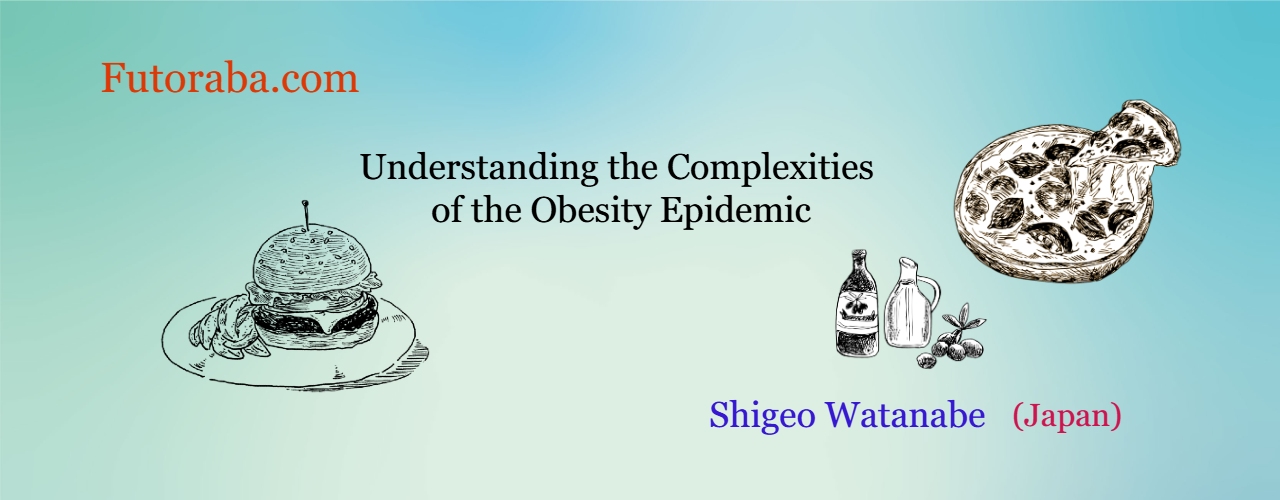Topics
11/21/2019
The Women's Health Initiative Dietary Modification Trial
(References: “The Obesity Code”: Dr. Jason Fung, 2016)
(In the U.S.)The National Institutes of Health recruited almost 50,000 post-menopausal women for the most massive, expensive, ambitious and awesome dietary study ever done. Published in 2006, this randomized controlled trial was called the Women's Health Initiative Dietary Modification Trial. This trial is arguably the most important dietary study ever done.
Approximately one-third of these women received a series of eighteen education sessions, group activities, targeted message campaigns and personalized feedback over one year. Their dietary intervention was to reduce dietary fat, which was cut down to 20 percent of daily calories. They also increased their vegetable and fruit intake to five servings per day and grains to six servings.
They were encouraged to increase exercise. The control group was instructed to eat as they normally did. Those in this group were provided with a copy of the Dietary Guidelines for Americans, but otherwise received little help. The trial aimed to confirm the cardiovascular health and weight-reduction benefits of the low-fat diet.
The average weight of participants at the beginning of the study was 169 pounds (76.8 kilograms). The starting average body mass index was 29.1, putting participants in the overweight category (body mass index of 25 to 29.9), but bordering on obese (body mass index greater than 30). They were followed for 7.5 years to see if the doctor-recommended diet reduced obesity, heart disease and cancer as much as expected.
The group that received dietary counseling succeeded. Daily calories dropped from 1788 to 1446 a dayーa reduction of 342 calories per day for over seven years. Fat as a percentage of calories decreased from 38.8 percent to 29.8 percent, and carbohydrates increased from 44.5 percent to 52.7 percent. The women increased their daily physical activity by 14 percent. The control group continued to eat the same higher-calorie and higher-fat diet to which they were accustomed.
The results were telling. The“Eat Less, Move More”group started out terrifically, averaging more than 4 pounds (1.8 kilograms) of weight loss over the first year. By the second year, the weight started to be regained, and by the end of the study, there was no significant difference between the two groups.
Did these women perhaps replace some of their fat with muscle? Unfortunately, the average waist circumference increased approximately 0.39 inches (0.6 centimeters), and the average waist-to-hip ratio increased from 0.82 to 0.83 inches (2.1 centimeters), which indicates these women were actually fatter than before. Weight loss over 7.5 years of the Eat Less, Move More strategy was not even one single kilogram (2.2 pounds).
This study was only the latest in an unbroken string of failed experiments. Caloric reduction as the primary means of weight loss has disappointed repeatedly.(*snip*)
Many people tell me, “I don't understand. I eat less. I exercise more. But I can't seem to lose any weight.” I understand perfectly-because this advice has been proven to fail.
Do caloric-reduction diets work? No.
(Overeating Experiments: Unexpected Results)
THE HYPOTHESIS THAT eating too much causes obesity is easily testable. You simply take a group of volunteers, deliberately overfeed them and watch what happens. If the hypothesis is true, the result should be obesity.
Luckily for us, such experiments have already been done. Dr. Ethan Sims performed the most famous of these studies in the late 1960s.(*snip*)
Could he make humans deliberately gain weight? This question, so deceptively simple, had never before been experimentally answered. After all, we already thought we knew the answer. Of course overfeeding would lead to obesity.
But does it really? Sims recruited lean college students at the nearby University of Vermont and encouraged them to eat whatever they wanted to gain weight. But despite what both he and the students had expected, the students could not become obese.(*snip*)
Dr. Sims changed course. Perhaps the difficulty here was that the students were increasing their exercise and therefore burning off the weight, which might explain their failure to gain weight. So the next step was to overfeed, but limit physical activity so that it remained constant. For this experiment, he recruited convicts at the Vermont State Prison. Attendants were present at every meal to verify that the caloriesー4000 per dayーwere eaten. Physical activity was strictly controlled
A funny thing happened. The prisoners' weight initially rose, but then stabilized. Though at first they'd been happy to increase their caloric intake, as their weight started to increase, they found it more and more difficult to overeat, and some dropped out of the study.(*snip)
After the experiment ended, body weight quickly and effortlessly returned to normal. Most of the participants did not retain any of the weight they gained.
11/21/2019
There Are Two Steps to Lose Weight the Right Way
-
Contents
-
- There are two ways to lose weight
- How to lower one's set-point weight
- What is your specific diet?
- Differences from low-carb diets
- The meaning of the “two-step"
- Health benefits
<The bottom line>
Although this is not a diet blog, since I’m writing the reasons why people gain weight, naturally, I thought about ways to lose weight, and I felt that I should write about it.
In this post, I will only write about my theory for losing weight. Please understand this is not based on practice, but I hope this will help someone.
1. There are two ways to lose weight
Just like the phrase “to gain weight” has two meanings, “to lose weight” also has two meanings.
【Related article】 The Two Distinct Processes Behind Weight Gain
(1) In the case you rebound
The first way is done by eating less and exercising more, as in conventional calorie-restricted diets. This method requires constant hunger.
The human body is thought to have a homeostatic function, and I use the "set-point" theory of body weight to explain its stable weight.
When food intake is significantly reduced and body weight decreases, the body perceives this as an energy crisis. In response, the body's protective metabolic mechanisms kick in to preserve energy stores, causing energy expenditure to drop significantly, more than expected[1,2]. Additionally, in my view, prolonged hunger increases the body's absorption rate as it tries to maximize nutrient intake.
Furthermore, the secretion of hormones that stimulate appetite increases, while the secretion of satiety hormones is suppressed[3]. You start feeling an overwhelming urge to eat.
In most cases, weight loss doesn't last long, and eventually, you rebound back to your original weight range.
In other words, attempts to sustain weight loss invoke adaptive responses involving the coordinate actions of metabolic, neuroendocrine, autonomic, and behavioral changes that ‘oppose’ the maintenance of a reduced body weight[4].
[Related article]
Dieting Doesn’t Work in the Long Run
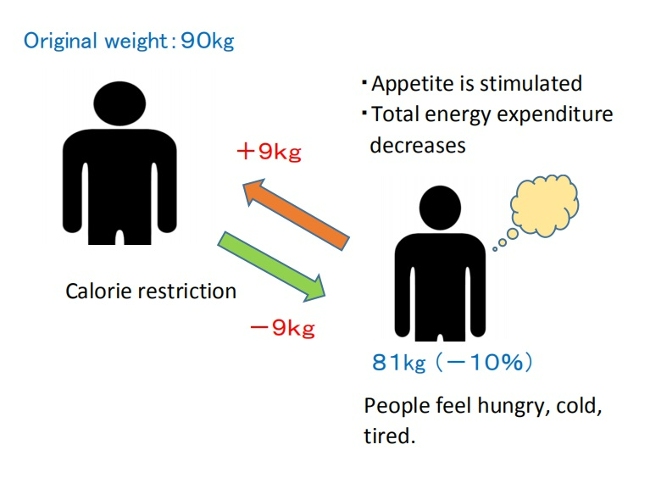
(2) Lower the “set-point weight” itself
I believe that the problem of obesity lies in the body’s “set point” being higher than normal.
As I mentioned in (1), the fact that obese individuals show metabolic resistance to calorie-restricted diets suggests that, for some people, obesity is a natural physiological state[5]. Animal studies also support the view that obesity is a state of energy regulation at a higher set-point[5].
Therefore, in order to lose weight properly, it is necessary to lower the set-point itself that serves as the foundation for maintaining the current state. I will cite relevant literature on this topic.
"There appears to be a “set point” for body weight and fatness, and the problem in obesity is that the set point is too high.(*snip*)
There are two prominent findings from all the dietary studies done over the years.
First: all diets work. Second: all diets fail.
What do I mean?
Weight loss follows the same basic curve so familiar to dieters. Whether it is the Mediterranean, the Atkins or even the old fashioned low-fat, low-calorie, all diets in the short term seem to produce weight loss. Sure, they differ by amount lost–some a little more, some a little less. But they all seem to work.
However, by six to twelve months, weight loss plateaus, followed by a relentless regain, despite continued dietary compliance.(*snip*)
So all diets fail. The question is why.
Permanent weight loss is actually a two-step process. There is a short-term and a long-term (or time-dependent) problem. "
( Fung J. 2016. The obesity code. pages 62,215 )
2. How to lower one's set-point weight
I believe that the "long-term problem" Doctor Fung refers to is addressing the underlying cause of the elevated set-point and lowering the set-point itself without triggering the body's resistance mechanisms.
Specifically, instead of being hungry frequently, I believe that eating more fibrous foods (such as whole grains, high-fiber vegetables and nuts) and foods that take longer to digest, can help reduce hunger and gradually lower the set-point for body weight.
This is because, according to my theory, the primary cause of weight gain, which leads to an increase in the set-point, is due to the mechanism of intestinal starvation. In other words, we need to do the opposite of feeling hungry at the time.
Although I can't fully explain it at this point, I believe that when the intestines are filled with nutrient-rich, undigested food, such as fibrous vegetables, beans, and dairy products, it signals to the body that "there is still enough food."
As a result, the body doesn't perceive it as a crisis and doesn't trigger resistance mechanisms involving changes in metabolism or neuroendocrine responses.
Additionally, as hunger decreases, appetite diminishes, and absorption rates gradually decline. Eventually, I assume that body fat would decrease due to the coordinated actions between the brain—particularly the hypothalamus—and organs and peripheral tissues, etc.[6]
■It may be difficult to understand how eating food reduces absorption rate, but imagine, for example, eating a snack bread and a glass of orange juice.
If you eat it when you are starving, your blood glucose level will jump up, whereas if you eat it three hours after finishing a well-balanced lunch, your blood glucose level will not rise as much.

Even when you go out for drinks, if you haven't eaten anything for almost ten hours, you may get drunk faster, but if you eat a good lunch and have ice cream two hours before drinking, you will get drunk more slowly. In other words, if you keep eating less digestible foods and slow-digesting foods to reduce hunger, the absorption rate of food should decrease.
3.What is your specific diet?
I think the key is to reduce carbohydrate intake to a certain extent and conversely increase meat, fish, oil/fat, fibrous vegetables, seaweed, nuts, dairy products, etc. to reduce the time you feel hungry.
(If you feel a little hungry, eat something. Eat regularly even if you don't have an appetite.)
Specifically, I believe there are two ways to do this.

(1) The way to actually improve your diet
♦Reduce carbohydrate intake (rice, bread, noodles, etc.) by half to a third.
♦Eat low G.I. carbohydrates if possible, such as brown rice, whole-grain bread, cold rice (starch turns indigestible once cooled down) and al dente pasta.
♦Increase foods other than carbs such as meat, fish, fat/oil, dairy products, nuts, fibrous vegetables, seaweed, etc.
♦Avoid processed foods, fast food, and snacks as much as possible, and prioritize minimally processed foods.
♦Eat at least three meals a day, and if you feel hungry between meals, it's okay to have a snack.
♦Of course, you can combine this step with running or gym workouts, but since calorie burning is not the goal, it's better to consume something like milk before or after exercising.
<Regarding fat intake>
Fats are an important energy source for the body, and at the same time a cause of weight gain for some, but I believe that it is a food that can help us lose weight depending on how we eat it.
Fats have traditionally been considered 'fattening' because they have a high energy density of 9 kcal per gram. However, since fats take longer to digest, consuming them frequently can help sustain a feeling of satiety and, in my opinion, even contribute to weight loss. (Of course, it differs from person to person)
[Related article] Eating Fat/oil Can be a Deterrent to Gaining Weight
(2) Slow down the digestive enzymes
For those who digest food quickly and don't easily feel satiated no matter how much they eat, Method (1) may have limited effectiveness. In fact, some may even gain weight due to the extra calories consumed.
In my theory, having a 'higher set weight' is related to an increase in absorption efficiency. Additionally, as obesity levels increase, losing weight can become more difficult because they digest food quickly and their absorption rate doesn’t decrease easily. Therefore, Method (1) is not necessarily incorrect, in theory.
In a similar case, in addition to improving the diet, it may be helpful to take medication that, for example, slows down the digestive process for fats and proteins, or decreases one’s appetite.
By slowing down the working of the gastrointestinal tract or lowering the ability to digest food, undigested food will remain longer in the intestines, which will have the same effect as (1) above.
( Naturally, it must be done under a physician's guidance.)
4. Differences from low-carb diets
I can’t recommend extreme carb-cutting like the ketogenic diet, but I believe it ends up being similar to a low-carb diet in practice.
Advocates of low-carb diets claim that the real cause of weight gain is carbohydrates, which triggers insulin release, and that instead of limiting them, you can eat as many protein-and fat-rich foods as you like to make up for the calories.
In reality, however, it is not "you can eat" but rather "you have to" in order to lose weight.
If you reduce meat, fish, and fats/oils as well, you will feel hungry just like in a conventional calorie-restricted diet, and such diets do not work for long, as studies have shown.

My theory is that carbohydrates are only an indirect cause of weight gain making it easier to induce intestinal starvation. The key is that we should consume more fibrous foods and slow-digesting foods, leaving more undigested food in the intestines, to suppress hunger. So, while carbohydrates are not necessarily bad, I believe that cutting the amount of carbohydrates in the diet will be more effective.
Of course, it is possible that reducing glucose, which provides immediate energy, may speed up weight loss in the short term.
5. The meaning of the “two-step”
For those who have been dieting by eating less, their caloric intake may at least increase . So "eat more to lose weight" may sound fishy.
However, reducing caloric intake is not the final point.
・In the short term, you may not experience the dramatic weight loss that comes with calorie-restricted diets, but by slightly reducing caloric intake and eating more fibrous foods and slow-digesting foods to reduce hunger, there is a possibility of gradual weight loss.
・In the long term, by continuing this approach, I suspect that the signal that "there is enough food" may take hold, and through the interaction between the brain—especially the hypothalamus—organs, and peripheral tissues[6], the set-point weight itself may decrease, leading to a body that doesn't experience the rebound effect.
Currently, even some researchers who recognize the concept of a body’s set-point view obesity as an incurable chronic disease[7]. They state that lifestyle interventions and obesity medications do not permanently alter the body’s set point, so weight loss achieved through dieting is not sustained, and weight lost with medication tends to rebound once the treatment is stopped[7].
However, in my view, this is because calorie-restrictive diets are fundamentally flawed. By focusing so much on calorie reduction, dieting has come to be seen as a difficult process that means giving up one’s favorite foods and enduring hunger. This approach only activates the body’s resistance mechanisms.
6. Health benefits
Even if you don't lose much weight, the health benefits are immeasurable. For example, while vegetables, legumes, nuts, fermented foods, and dairy products contain some calories, I believe there's no need to worry about that.
As many nutritionists and gut health experts say, these foods are rich in vitamins and minerals, promote a healthy gut microbiome, improve gut health, boost immunity, and help prevent spikes in blood sugar. These benefits far outweigh the calorie content and likely help prevent and/or improve lifestyle diseases. Even minimally processed meats and seafood are essential, as they provide protein, fats, and minerals that are vital for the body.
The bottom line
(1)Just as the phrase "to gain weight" has two meanings, "to lose weight" also has two meanings.
To avoid rebounding, the set-point weight itself must be lowered.
(2)Lowering the set-point weight requires a two-step approach:
・In the short term, reducing refined carbohydrates and ultra-processed foods, etc., and conversely increasing less digestible foods and slow-digesting foods while adjusting caloric intake, can help reduce hunger and, in turn, may gradually lead to weight loss.
・In the long term, by continuing this approach, I believe that signals that "there is enough food" may permeate the body, which, through the interactions between the brain, digestive system, pancreas, and fat tissues, the set-point weight itself can be reduced, making the body less likely to rebound.
(3)As obesity levels increase, losing weight with diet alone may become more challenging.
I consider this is partly because they digest food quickly and don’t easily feel satiated, resulting in no reduction in absorption efficiency.
In such cases, administering medication to slow down digestive enzymes or reduce appetite might be effective for some patients with obesity.
(4)Even without significant weight loss, eating balanced meals regularly is beneficial for maintaining health and may help prevent and/or improve lifestyle-related diseases.
References:
[1]Hall KD, Guo J. Obesity Energetics: Body Weight Regulation and the Effects of Diet Composition. Gastroenterology. 2017 May;152(7):1718-1727.e3.
[2]Egan AM, Collins AL. Dynamic changes in energy expenditure in response to underfeeding: a review. Proc Nutr Soc. 2022 May;81(2):199-212. doi: 10.1017/S0029665121003669. Epub 2021 Oct 4.
[3] Jason Fung. 2016. The obesity code. Canada: Greystone Books, Page 62.
[4] Rosenbaum M, Leibel RL. Adaptive thermogenesis in humans. Int J Obes (Lond). 2010 Oct;34 Suppl 1(0 1):S47-55.
[5]Richard E. Keesey, Matt D. Hirvonen. Body Weight Set-Points: Determination and Adjustment. The Journal of Nutrition, Volume 127, Issue 9, 1997, Pages 1875S-1883S, ISSN 0022-3166.
[6]Wilson JL, Enriori PJ. A talk between fat tissue, gut, pancreas and brain to control body weight. Mol Cell Endocrinol. 2015 Dec 15;418 Pt 2:108-19.
[7]Garvey WT. Is Obesity or Adiposity-Based Chronic Disease Curable: The Set Point Theory, the Environment, and Second-Generation Medications . Endocr Pract. 2022 Feb;28(2):214-222.
08/14/2019
Gaining Weight by Intestinal Starvation; What Does It Mean?
Contents
- Hunger in Africa and hunger in the modern era
- Why do we gain weight during periods of starvation?
- What happens when one’s set-point weight is elevated?
Let me explain something about the core of this blog.
Perhaps for most of you it is hard to believe me, but I’ll just write the facts as they are, as I experienced them. I did not write this from my imagination, but based it on my own analysis of what actually happened to me.
When I got into college, my total body weight fell down to the thirty-kilo range, so I knew exactly why I gained almost five kilos so rapidly in a few days, even though I didn’t eat much.
1. Hunger in Africa and hunger in the modern era
The idea of storing fat in the body as a reserve against starvation is something every researcher considers at one time or another.
However, it is said that this theory is an idea that has been rejected by researchers throughout history. This is because many overweight people often eat more, and many African refugees are thin and malnourished.
One might say, “If starvation makes us fat, then African refugees would be obese.”

However, please understand that this is a true state of starvation (malnutrition) in which the people can’t eat even if they want to, and I’m stating that it is different from what I call “intestinal starvation.”
African refugees do not have access to digestible food, and malnutrition even diminishes their ability to digest food and nutrients.
In contrast, many of us in developed countries are more likely to eat westernized foods made from wheat, meat, eggs, etc., which provide good nutrition and are easier to digest. Therefore, if we focus on the inner workings of our intestines, we are more prone to inducing intestinal starvation.
The reality is that being overweight has become a problem even among the poor populations in the world. What is common in these cases is not the excessive intake of calories or sugars, but rather a diet that is low in nutritional value and unbalanced, often due to a reliance on inexpensive refined carbohydrates and a lack of vegetables.
2. Why do we gain weight during periods of starvation?
In my blog, I mentioned that one’s set-point for body weight goes up by inducing intestinal starvation, and I want to explain what it means here. For the sake of explanation, I will use plants as an example.

(1) For plants, eating food and gaining weight is done by adding "fertilizer." This fertilizer is the equivalent to our diet, and of course, we need to use fertilizer periodically for growth.
However, using too much fertilizer doesn’t usually result in producing a bigger plant, and if we use it too often, it may sometimes have a negative effect.
The same goes for humans, and just eating a lot of calories doesn’t necessarily mean we all gain weight and become overweight. Even if we eat only one meal a day, as long as it’s well-balanced, there will be enough nutrition left in the intestines to be absorbed.
(2)Using an example of a plant, weight gain by inducing intestinal starvation and an increase in set-point for body weight could be explained in the same way as a plant that is extending its roots and taking in more nutrients. (See figure below)

When there is not enough nutrition, plants grow their roots deeper into the ground seeking more nutrients, and the same phenomenon occurs when we humans digest all the food in our entire intestines (or it may be the small intestine only), and intestinal starvation is induced.
(It is said that “the small intestine is the second brain” or that “it has a will,” and I clearly felt the will of my small intestine.)
Actually the villi (*1) of the intestines do not grow, but I believe that the following phenomena occur:
(*1)In order to absorb more nutrients efficiently, the interior of the small intestine has a folded structure, with numerous protrusions called villi on its surface (Fig. 1). Additionally, microvilli develop on the surface of these villi.
It is sometimes said that if all of these were spread out, the surface area inside the small intestine would be equivalent to that of a tennis court.
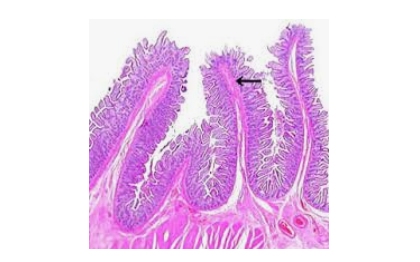
<Fig. 1> Villi of the small intestine
First, I believe that the intestines (especially the small intestine) is the first organ to sense whether or not food is present. This is determined not only by the amount of energy, but also by how far the food has been digested. (For this reason, even if you eat a large amount, if your diet is heavily skewed towards easily digestible carbohydrates, intestinal starvation can be induced.)
When undigested substances, including fiber, remain in the intestines to some extent, the body perceives that “there is still food,” even if you're hungry. However, when all the food is digested (or very close to it), the small intestine sends a signal to the brain that “there is no food.”
In response, the body attempts to absorb more nutrients, and microscopic substances attached to the villi (or microvilli) of the small intestine detach themselves (Fig. 2). This, in turn, increases the surface area for absorption, thereby boosting absolute absorption capacity.
This causes weight gain, suggesting an increase in the set-point for body weight, and reaches a new equilibrium at a higher set-point within just three to four days.
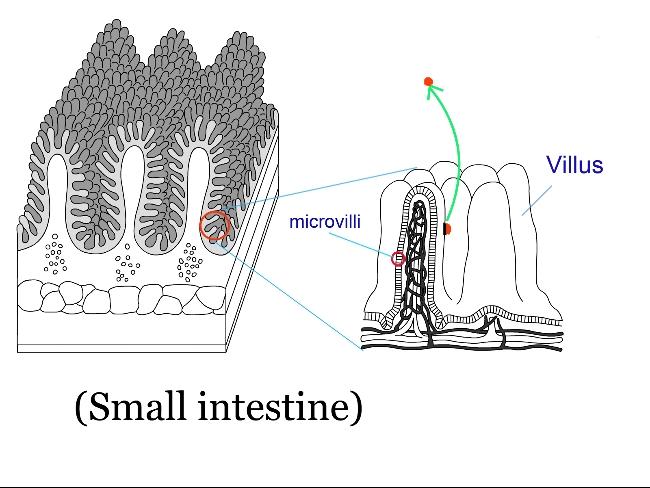
<Fig. 2 >
In other words, weight doesn't gradually increase due to excess calories being stored bit by bit. Instead, the body normally maintains a stable set-point weight, but at some point, it suddenly jumps, whether by 300 grams or 500 grams, all at once (Fig. 3).
In summary, I believe that one of the key factors in the fundamental difference between obese and lean people involves their absorption ability.
[Related Article]
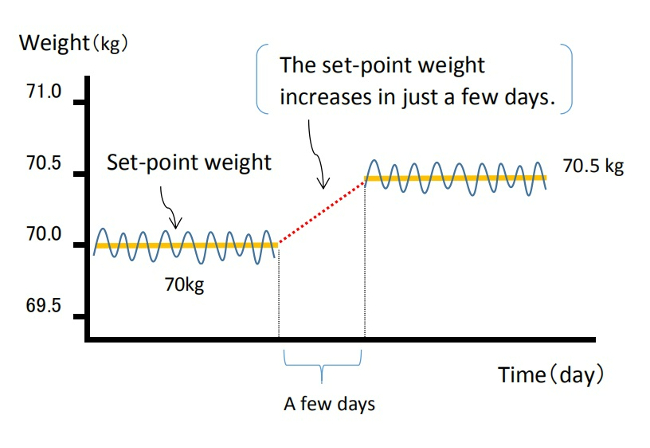
< Fig. 3 >
In Japan, obese individuals sometimes say things like, “I gain weight even just by drinking water.”
Of course, water alone does not make them fat, but I don't think it is totally wrong. It reflects just how efficient their absorption rate is.
3. What happens when one’s set-point weight is elevated?
(1) Once you gain weight, it becomes more difficult to lose weight
When your set-point for body weight goes up and you gain weight, it means that the balancing point, in terms of "energy- in, energy-out," has gone up, which can generate a more positive energy cycle and make it more difficult to lose weight.
When dieting, temporarily reducing the caloric intake to lose weight means reducing the "fertilizer" in the example of a plant. However, it is only a temporary weight loss, and you will likely return to your original weight when you start eating a normal diet again (the rebound effect).
Moreover, the reason why each time some people diet, they rebound and gain more weight than before is that skipping meals or eating light meals (not enough vegetables) can lead to intestinal starvation, which can further increase your set-point weight.
(2) More muscle, too
It is not that after you get fat, you gain muscle to support it. Since the overall absorption of nutrients increases, I believe that weight gain, at least to some extent, involves not only an increase in body fat but also lean mass such as muscle.

When a fat person loses body fat, they often have a thick, muscular chest or thighs. After body fat is gained, would the muscles around the chest and neck thicken to support that weight? (This varies widely from person to person.)
(3) Cause-and-effect reverse phenomenon
The increased intake of nutrients as a whole, including protein, creates a positive cycle of energy, which leads to the following phenomena.
Since digestive enzymes, hormones, etc. are also made from proteins (amino acids), it could enhance the ability to digest food and potentially bring about changes in the hormonal systems that regulate appetite and other functions. So, it is no wonder that people with larger bodies or stronger stomachs generally eat more than others.
There exists a cause-and-effect reversal phenomenon: people do not gain weight because they eat more, but because the bigger they are, the hungrier they become, and in turn, they eat more.
(4) Those who are overweight are prone to gaining more weight
Even if everyone eats exactly the same amount, people with big bodies-big, meaning large with some extra body fat or muscularly built-, or obese people, are more likely to feel hungry, which means that they eat relatively less, and they tend to gain more weight little by little.
It may be a vicious circle where a person eats modest amounts and gains weight, and if they skip meals or eat less to lose weight, they gain even more weight in the long run.
【Related article】→What Does It Mean to Eat Relatively Less?

On the other hand, if a lean person eats balanced meals three times a day, every day, he or she doesn’t induce intestinal starvation. And there is a good chance they will stay the same weight and have the same appearance for the rest of their life, regardless of caloric intake.
Therefore, "fatness" and "non-fatness," in this regard, are not due to obesity genes.
Also, for people like me who are very thin, being thin itself can reduce the amount of protein and other nutrients that can be taken in, thus a negative energy cycle continues. In turn, the muscles that support the stomach and intestines become weak and droopy, and the ability to digest food is also diminished by not secreting enough digestive enzymes.
This is a vicious circle where thin people can’t gain weight and remain thin.
06/22/2019
Obesity as a Multifactorial Disease: "Confounding Factors" in Environmental Influences
-
Contents
-
- "Overeating causes obesity" is too simplistic
- Can environmental and behavioral factors be identified?
- Intestinal starvation can be considered a “confounding factor”
<The bottom line>
1. "Overeating causes obesity" is too simplistic
Reuters and the market research firm Ipsos conducted an online poll in the United States in 2012 with 1,143 adults. The poll found that 61% of American adults believed that "personal choices about eating and exercise" were responsible for the obesity epidemic[1,2]. Many Americans still hold the belief that people who become obese lack willpower, overeat, and don't exercise enough[2].
Similarly, in Japan, even news anchors and experts frequently make statements like, "It's only natural to gain weight if you overeat and don’t exercise." This suggests that many Japanese people likely hold the same belief.
However, scientific research indicates that "personal choices" may not account for all cases of obesity[2].
Classical genetic studies based on adoption studies, family studies, twin studies, etc., indicate that about 50–70% of the variance (heritability estimates) in BMI is genetic (Those estimates vary depending on the study design and assessment methods) [3].
(Note: In the following article, I explain that raising children in different home environments does not necessarily constitute “environmental changes” that alter their set-point weight.)
[Related article]
Does Obesity Run in the Family or Is It Due to the Living Environment?

Even today, the heritability of obesity is estimated at 40% to 70%[4].
Some researchers point out that numerous different genes have been found to be involved in food selection, food intake, absorption, metabolism, and energy expenditure including physical activity. When considering interactions between gene-by-gene or gene(s)-by-environment(s), the complexity of the mechanisms underlying weight regulation becomes even greater[3].
In a 1998 report published by the U.S. National Institutes of Health (NIH), experts at the time described obesity as a complex, multifactorial chronic disease that develops from an interaction between genotype and the environment (Taubes G. 2010. Why we get fat. Page 76).
In 2012, the American Association of Clinical Endocrinology (AACE) also designated obesity as a chronic disease.
This designation was based on two key points : first, like other chronic diseases, the pathophysiology of obesity is complex, involving interactions among genes, biological factors, the environment, and behavior; second, obesity meets the three criteria that constitute a disease as defined by the American Medical Association[5].
2. Can environmental and behavioral factors be identified?
Assuming that human genes as a whole are unlikely to undergo significant changes over a short span of 50 or 100 years, I believe that the global rise in obesity since the 1970’s is largely attributable to environmental and behavioral factors. I would like to explore this in greater detail.
I will quote an interesting description that is relevant to my blog.
“What causes weight gain? Contending theories abound:
・Calories ・Food reward・Food addiction
・Sugar・Sleep deprivation ・Stress
・Refined carbohydrates・Wheat
・Low fiber intake・All carbohydrates
・Genetics・Dietary fat ・Red meat
・Poverty ・All meat・Wealth
・Dairy products・Gut microbiome
・Snacking・Childhood obesity

The various theories fight among themselves, as if they are all mutually exclusive and there is only one true cause of obesity. For example, recent trials that compare a low-calorie to a low-carbohydrate diet assume that if one is correct, the other is not. Most obesity research is conducted in this manner.
This approach is wrong, since these theories all contain some element of truth."
(Jason Fung. 2016. The Obesity Code. Page 70.)
"THE MULTIFACTORIAL NATURE of obesity is the crucial missing link. There is no one single cause of obesity. (*snip*)
What we need is a frame work, a structure, a coherent theory to understand how all its factors fit together. Too often, our current model of obesity assumes that there is only one single true cause, and that all others are pretenders to the throne. Endless debates ensue.
Too many calories cause obesity. No, too many carbohydrates. No,
too much saturated fat. No, too much red meat. No,
too much processed foods. No, too much high fat dairy. No,
too much wheat. No, too much sugar. No,
too much highly palatable foods. No, too much eating out. No
It goes on and on. They are all partially correct. (*snip*)
All diets (e.g., calorie restriction, low-fat, paleo, vegan) work because they all address a different aspect of the disease. But none of them work for very long, because none of them address the totality of the disease.
Without understanding the multifactorial nature of obesity-which is critical -we are doomed to an endless cycle of blame."
(Jason Fung. The Obesity Code. Pages 216-217.)
I think the author provides a keen insight into the multifactorial nature of obesity. We must first understand that being overweight is not as simple as "it happens because we overeat," but arises from a complex interplay of various factors.
However, what I want to emphasize is that, based on my intestinal starvation idea, these complex environmental and behavioral factors can be consolidated to some extent, which means that while those factors often blamed as causes of obesity appear intertwined and hard to explain, if we focus on the unseen workings of the intestines, the underlying causes will become much clearer.
3. Intestinal starvation can be considered a “confounding factor”
As I’ve already explained, please understand that the phrase “gaining weight” has two meanings.
【related article】
The Two Distinct Processes Behind Weight Gain
The mechanism that many people refer to as “get fat by eating a lot” is in the range of (A) in the graph below.
Moreover, I think that most of the Intervention studies on obesity so far have only been comparative studies that involve reducing the intake of calories, regulating the amount of carbs or fat, or increasing exercise, etc. The experiment they are doing is also in the range of (A).
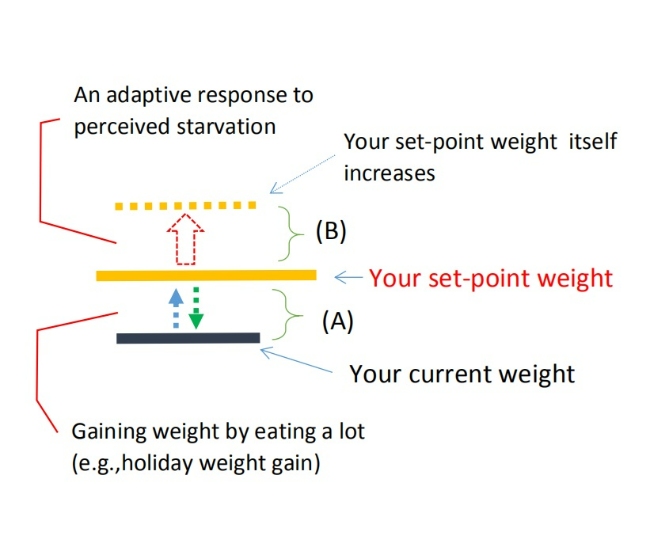
Of course, everyone will lose some weight if they reduce their caloric intake and incorporate exercise, although individual differences may vary.
However, that is not the fundamental way to deal with being overweight, as Dr. Fung mentioned, so regaining weight (the rebound effect) is inevitable if you eat as before.
▽In contrast, when (B) the 'set-point' for body weight goes up by intestinal starvation, there are various interrelated factors.
For instance, it is said that the following affects weight gain:
・Skipping breakfast ・Late dinner ・How many meals you eat
・Refined carbohydrates ・Processed food
・Lack of fiber intake ・Unbalanced diets
These are some of factors that are related to part (B) of the graph.
The important thing here is that each of these factors seems to be linked to weight gain, but there is no causality between each factor and outcome. Rather, they are related to inducing intestinal starvation, and intestinal starvation has a causal relationship with obesity (In this case, some may say intestinal starvation can be the “confounding factor”).

As I’ve already explained in another article, a combination of some of these factors below (from category 1 to 4 of the table) happening simultaneously or overlapping, can cause intestinal starvation, and the occurrence of intestinal starvation may be pinpointed in the unseen workings of the entire intestinal track (or it may be the small intestine only).
[Related article]
Three (+one) Factors to Accelerate “Intestinal Starvation”

The bottom line
(1)Our understanding of how and why obesity occurs is still incomplete. There is a growing societal acceptance of the idea that obesity, like other chronic diseases, has a pathophysiology that is complex and involves interactions among genes, biological factors, environment, and behavior.
(2)Many factors often blamed for causing weight gain—such as refined carbohydrates, processed foods, fats, or skipping breakfast—are discussed only in isolation.
Researchers may be well-versed in their specific areas of research—such as resistant starch, the benefits of eating breakfast, the effects of low-carb diets, hormones, or gut microbiota—but each theory does not necessarily grasp obesity as a whole and often end up being treated in isolation.
What we need now is a framework that shows how each theory is intertwined, and I’d like to believe my theory can contribute to that understanding.
(3)The root cause of being overweight, I believe, lies in the higher set-point weight, which is caused by intestinal starvation. In my opinion, intestinal starvation is a "confounding factor" because it is closely linked to “what we eat” and eating habits (e.g., skipping breakfast, late-night meals, or meal frequency) and also directly influences weight gain (the outcome).
In other words, by focusing on the unseen internal activity of the gut, I believe we can better identify the causes of weight gain.
<References>
[1]Begley S. America's hatred of fat hurts obesity fight. Reuters. May 11, 2012.
[2]Jou C. The biology and genetics of obesity--a century of inquiries. N Engl J Med. 2014 May 15;370(20):1874-7.
[3]Speakman JR, Levitsky DA, Allison DB, et al. Set points, settling points and some alternative models: theoretical options to understand how genes and environments combine to regulate body adiposity. Dis Model Mech. 2011 Nov;4(6):733-45.
[4]McPherson R. Genetic contributors to obesity. Can J Cardiol. 2007 Aug;23 Suppl A(Suppl A):23A-27A.
[5]Garvey WT. Is Obesity or Adiposity-Based Chronic Disease Curable: The Set Point Theory, the Environment, and Second-Generation Medications. Endocr Pract. 2022 Feb;28(2):214-222.
01/04/2019
The Dilution Effect/ Pushing Out Effect of Carbohydrates: Does This Cause People To Gain Weight?
Contents
- If there were no carbohydrates
- Meals high in indigestible foods are not fattening
- The effect of carbohydrates that make it easier to gain weight
(1) Dilution effect
(2) Pushing out effet
<The bottom line>
When we consider that “eating a lot leads to gaining weight,” I believe you have the image of carbohydrates like bread, rice, and noodles in mind.

This time, I am going to explain the reason why carbohydrates (*1) make it easier for people to gain weight, not because of an increase in calories or of its tendency to raise blood sugar levels, but by other indirect ways.
(*1) Although technically sugar is also a sort of carbohydrate, I use the word carbohydrate here to mean “polysaccharide” such as starches, bread, and rice.
1. If there were no carbohydrates
When my total body weight fell to under forty kilograms, it would have been impossible to have gained weight without the help of carbohydrates. In my case, neither fat nor sugar could have done that … In other words, I would never have gained weight by eating cream-filled cakes or oily pork cutlets and fatty Chinese food. Next, I am going to explain the reason why.
First, not all carbohydrates are the same. Carbohydrates are mainly categorized by their chemical structure into monosaccharides, disaccharides, oligosaccharides, and polysaccharides.
However, substances like cellulose (a polysaccharide), which is treated as dietary fiber, non-digestible oligosaccharides and resistant starch, should be consumed to improve health.
Additionally, while simple carbohydrates like sugar may lead to temporary weight gain or blood sugar-related disorders, I believe they are not a cause of weight gain in the sense that they increase one’s set-point weight.

In terms of increasing the body's set-point weight, I believe the cause of weight gain is the consumption of easily digestible carbohydrates that are high in starch (polysaccharides) and low in dietary fiber, such as refined grains like rice and wheat, and potatoes.
Therefore, foods like brown rice, wholegrain bread, fried rice, and cold rice, while being the same type of carbohydrate, may produce different results.
These are known as low G.I. foods, which don't raise blood sugar levels easily, or resistant starches. In other words, these foods contain many indigestible components or take longer to digest and absorb.
2. Meals high in indigestible foods are not fattening
When you constantly consume foods that are less digestible or slowly digested and absorbed-such as the above-mentioned carbohydrates that don’t raise the blood sugar level, tough meats, fat, fibrous vegetables, seaweed, and dairy product-intestinal starvation is less likely to occur and you are less likely to gain weight, which means the set-point for body weight is unlikely to go up.

I’m simply saying that it is hard to gain weight if a lean person eats them properly every day.
Although a person who is already overweight may not lose weight by eating some less digestible foods, I consider that it may be possible to lose weight depending on how you eat them, since these foods are always discussed in dieting techniques.
3. The effect of carbohydrates that make it easier for people to gain weight
On the contrary, digestible refined carbohydrates that are high in starch (rice, rice porridge, white bread, potatoes, etc.) and processed starches extracted from plants promote overall digestion. By eating them together with digestible proteins, they make it easier to induce intestinal starvation.
Those are two effects that I can think of so far.
(1) Dilution effect
If you proportionally increase digestible carbohydrates (rice, noodles, bread, etc.) in the meal, the percentage of side dishes such as fat, meat, fish, and vegetables will be relatively smaller. The density of a spoonful of oil will be lower if you eat more bread or rice portions with soup (water).

When you eat some meat together with a slice of bread and soup, the density of the meat will be lower.
In other words, easily digestible carbohydrates and water are added and mixed in the stomach, and then the diluted nutrients are sent to the intestines. So, it will be easier to get hungry and induce intestinal starvation.
For example, let’s say you eat a hamburger and a potato, plus another piece of bread and tea. If we mix all of these in a blender, it will be something like meat diluted with starch and water.

In contrast, if we remove the bread and add mixed beans-mayonnaise salad… the dilution effect of carbohydrates will be less, and fiber and fat will be added.
On a caloric basis, mixed beans-mayonnaise salad is, e.g. 100kcal. However, adding it to the meal doesn’t have the same meaning as adding another piece of bread. This is why calorie intake basis thinking may go wrong.

Moreover, as seen in low-carb diets, what would happen if you decrease the intake of carbohydrates in the meal and instead increase proteins such as meat and fish, fat, and vegetables, etc.?
In this case, the opposite effect of the dilution effect occurs: dense nutrients are delivered to the intestines, which slows digestion and undigested food always remains in the gastrointestinal tract.
(2) Pushing out effect

"Balloon effect"
Starch-rich carbohydrates, when consumed with water, cause stomach bloating (I’ll call this the “balloon effect” of the stomach). And, if we eat carbs together with digestible side dishes such as stew (onion, potatoes, low-fat chicken, etc.), its holding time in the gut will be shorter since it’s easy to digest, and the food will be pushed out of the stomach fairly soon. Also, our intestines start to move actively and smoothly.

I had the problem with my stomach and intestines and often suffered from constipation or diarrhea.
But, when I ate Japanese soba noodles(*2) and small rice bowl dishes (chicken and egg over rice), it promoted regular bowel movements and relieved my symptoms several times.
(*2) If you don't know much about soba, it may be easier to imagine ramen noodles without oil.
On the other hand, you may think that eating fatty foods or deep-fried foods give us stamina. It actually means that those foods fill us up better than carbs do, and its energy could be sustained during sports such as a marathon or a soccer match.
That is to say, undigested foods stay longer in our stomach and intestines, so it’s more difficult to induce intestinal starvation.
The bottom line
(1) Simply put, incorporating fibrous foods and slow-digesting foods in your diet makes you less likely to gain weight compared to other meals with the same caloric content.
On the other hand, combining easily digestible foods (such as refined carbohydrates, proteins, and ultra-processed foods) in your diet makes you more likely to gain weight.
(2) Carbohydrates are generally classified into monosaccharides, disaccharides, oligosaccharides, and polysaccharides, depending on their chemical structure.
Substances like cellulose (polysaccharides) which are considered dietary fiber, non-digestible oligosaccharides, and resistant starch, would not cause weight gain and should be consumed to promote health.
I also believe that simple carbohydrates like sugar may cause an increace in blood sugar levels and temporary weight gain, but they are not a cause of weight gain in the sense that they increase one’s set-point weight.
(3) In terms of increasing the body's set-point weight, I believe the foods that may cause obesity are easily digestible carbohydrates (polysaccharides) high in starch, such as white rice, white bread, noodles, and potatoes.
These foods expand with water in the stomach (balloon effect) and may have a "dilution effect" or "push-out effect" in the digestive process, which might lead to intestinal starvation.
(4) Obesity among poverty-stricken people worldwide can be understood as the influence of cheap refined carbohydrates and unbalanced diets (lack of vegetables, etc.). Considering them, it may be easier to imagine that they are not gaining weight due to taking too many calories or sugar, but rather from consuming cheap carbohydrates as mentioned above.
[Related article] Wealthy People Get Fat? Poor People Get Fat?
